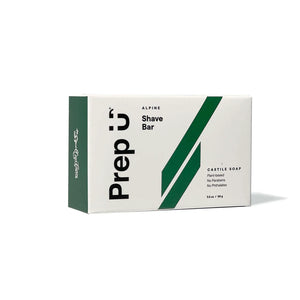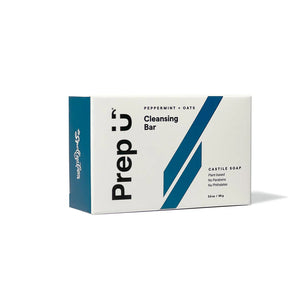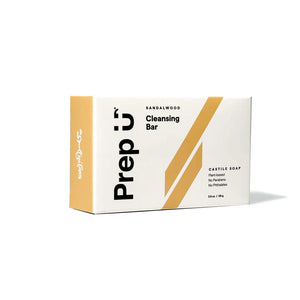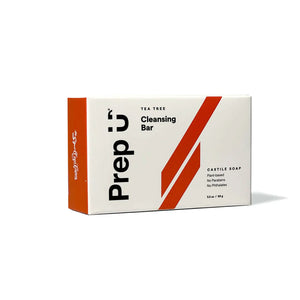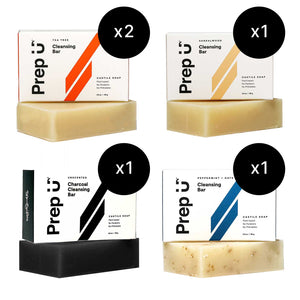Can Antifungal Soap Help with Acne? Clear Answers for Teens
Can Antifungal Soap Help with Acne? (What Teens & Parents Should Know)
If you’ve ever wondered why your breakouts just won’t quit—even after trying every face wash and spot treatment in the aisle—you’re not alone. Acne is complicated, but what if the answer isn’t just about oil and bacteria?
Let’s talk about a question a lot of teens (and parents) are asking: Can antifungal soap help with acne? We’ll break down the facts, bust some myths, and show you how Prep U’s natural solutions can help support clearer, more comfortable skin.
What’s the Deal with Acne, Anyway?
Acne is more than just a “teen thing”—it’s a mix of oil, dead skin, bacteria, hormones, and sometimes even yeast (a type of fungus).
- Red bumps, whiteheads, blackheads, and sometimes painful cysts
- Usually on the face, chest, back, or shoulders (“bacne”)
- Flare-ups after sports, sweating, or big life changes (thanks, puberty!)
Most people think bacteria are the only culprit, but there’s more to the story.
Why Are Teens (and Parents) Asking About Antifungal Soap for Acne?
- Traditional acne washes focus on oil and bacteria, but sometimes that’s not enough.
- Fungal acne (also called “Malassezia folliculitis”) looks a lot like regular acne but is actually caused by yeast on the skin.
- Sports, sweat, and hot weather can make fungal acne more likely—especially for teens.
If you’ve tried all the usual acne routines and still see stubborn bumps, it might be time to try something different.
What’s the Difference Between Regular Acne and Fungal Acne?
- Regular acne: Caused by clogged pores, extra oil, and bacteria. Shows up as a mix of whiteheads, blackheads, and red pimples.
- Fungal acne: Caused by yeast (Malassezia) overgrowth. Usually appears as small, itchy bumps—often on the forehead, chest, or back. It doesn’t always respond to regular acne products.
Not sure which you have? If your breakouts are itchy, show up in clusters, or don’t improve with traditional treatments, fungal acne might be in the mix.
Can Antifungal Soap Help with Acne?
Some teens and parents have found that using a gentle, plant-based soap with tea tree oil—like Prep U’s Tea Tree Cleansing Bar—can help wash away impurities and leave skin feeling clean and refreshed, especially after sweating or sports. Tea tree oil is known for its naturally cleansing and refreshing properties, which can help support clearer-looking skin.
It’s important to remember:
- Not all acne is fungal, and everyone’s skin is different.
- For severe or persistent acne, check in with a dermatologist.
How to Use Antifungal Soap for Acne (The Right Way)
- Lather up with a gentle, plant-based soap like Prep U’s Tea Tree Cleansing Bar.
- Focus on areas where you get breakouts—face, chest, back, shoulders.
- Let the lather sit for 30–60 seconds before rinsing.
- Use daily, especially after sweating or sports.
- Always moisturize with a non-comedogenic, fragrance-free lotion if your skin feels dry.
Read the full guide: How to Use Antifungal Soap for Maximum Results
Why Prep U’s Tea Tree Cleansing Bar Is a Smart Choice
- Tea tree oil: Valued for its naturally cleansing and freshening properties
- Plant-based oils: Hydrate and nourish, so skin isn’t left dry or tight
- No harsh chemicals: Free from parabens, sulfates, artificial fragrances, and dyes
- Tested for sensitive skin: Gentle enough for teens, tough enough for breakouts
- Leaping Bunny and Good Face Project certified
It’s a simple swap that can support fresher, more comfortable skin—especially for stubborn, sweat-related breakouts.
Learn more about Tea Tree Oil Benefits for Teen Skin
Real Stories: “Finally, Something That Works”
“My son’s back acne wouldn’t budge until he started using Prep U’s Tea Tree Bar. Now he’s clear—and actually likes using it.”
— John, Parent
“I tried everything for my chest breakouts. The Tea Tree Bar is the only thing that helped, especially after practice.”
— Gavin, Teen Athlete
“I had no idea my ‘acne’ was actually fungal. Switching to an antifungal soap made all the difference.”
— Colton, Teen Athlete
FAQs
Can antifungal soap help with all types of acne?
It’s most often used for fungal acne, but tea tree oil can help support clearer-looking skin.
How do I know if I have fungal acne?
If your breakouts are small, itchy, in clusters, and don’t respond to regular acne products, it might be fungal. See a dermatologist for a sure answer.
Is Prep U’s Tea Tree Bar safe for my face?
Yes! It’s gentle, but always patch test first—especially on sensitive skin.
How often should I use antifungal soap for acne?
Daily use is safe for most teens, especially after sweating or sports.
Will it dry out my skin?
Prep U’s bar is made with hydrating oils, so it cleans without stripping. Always follow up with a gentle moisturizer if needed.
Can I use it with my other acne treatments?
Usually, yes—but go slow and watch for irritation. When in doubt, ask your dermatologist.
What if my acne gets worse?
Stop use and see a doctor. Some skin needs extra help or a different approach.
Can antifungal soap help with body acne (“bacne”)?
It’s a great option for breakouts on the chest, back, and shoulders.
More Resources & Internal Links
- Anti Fungal Soap for Teens: The Complete Guide
- Tea Tree Oil Benefits for Teen Skin: Natural Solutions
- How to Use Antifungal Soap for Maximum Results
- Natural Remedies for Body Odor
- Antifungal vs. Antibacterial Soap
Wrap-Up: Acne Isn’t One-Size-Fits-All—But Your Soap Can Help
Acne can be complicated, but with the right knowledge and a gentle, effective cleansing routine, you’re already ahead of the game.
Ready to try something new? Check out Prep U’s Tea Tree Cleansing Bar or browse our full lineup of natural solutions. Got questions? We’re always here for honest answers—no embarrassment, just real support.
Explore Them All




